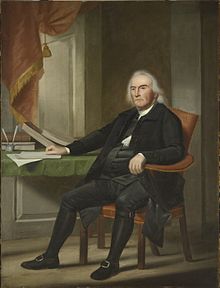New England's Dark Day

New England's Dark Day (19 May 1780) was a date when an abnormal darkening of the day sky was observed over the New England states and parts of Canada. Speculation exists that this was due to a combination of smoke from forest fires and a thick fog. The darkness was so complete that candles were required from noon until midnight, when it finally dispersed and the stars could be seen.
Quotes
[edit]
- In some places, the darkness was so great, that persons could not see to read common print in the open air, for several hours together: but I believe this was not generally the case. The extent of this darkness was very remarkable.
- The darkness of the following evening was probably as gross as ever has been observed since the Almighty fiat gave birth to light. It wanted only palpability to render it as extraordinary, as that which overspread the land of Egypt in the days of Moses .... if every luminous body in the universe had been shrouded in impenetrable shades, or struck our of existence, the darkness could not have been more complete. A sheet of white paper held within a few inches of the eyes was equally invisible with the blackest velvet. Considering the small quantity of light that was transmitted by the clouds, by day, it is not surprising that, by night, a sufficient quantity of rays should not be able to penetrate the same strata, brought back the shifting of winds. to afford the most obscure prospect even of the best reflecting bodies.
- Letter of Samuel Tenney, an eye-witness (December 1785), in Collections of the Massachusetts Historical Society Vol. 1 (1792), p. 97
- The 19th of May, 1780, was a remarkable day. Candles were lighted in many houses; the birds were silent and disappeared, and the fowls retired to roost. The legislature of Connecticut was then in session at Hartford. A very general opinion prevailed, that the day of judgment was at hand. The house of Representatives, being unable to transact their business, adjourned. A proposal to adjourn the Council was under consideration. When the opinion of Colonel Davenport was asked, he answered, "I am against an adjournment. The day of judgment is either approaching, or it is not. If it is not, there is no cause of an adjournment: if it is, I choose to be found doing my duty. I wish therefore that candles may be brought."
- Timothy Dwight, in Connecticut Historical Collectons 2d ed (1836) compiled by John Warner Barber, p. 403
Abraham Davenport
[edit]
The Day of Judgment which the world awaits;
But be it so or not, I only know
My present duty, and my Lord's command
To occupy till He come.
- The famous Dark Day of New England, May 19, 1780, was a physical puzzle for many years to our ancestors, but its occurrence brought something more than philosophical speculation into the minds of those who passed through it. The incident of Colonel Abraham Davenport's sturdy protest is a matter of history.
- Whittier's preface to the poem in The Complete Poetical Works of John Greenleaf Whittier (1873)
- 'T was on a May-day of the far old year
Seventeen hundred eighty, that there fell
Over the bloom and sweet life of the Spring,
Over the fresh earth and the heaven of noon,
A horror of great darkness, like the night
In day of which the Norland sagas tell, —
The Twilight of the Gods. The low-hung sky
Was black with ominous clouds, save where its rim
Was fringed with a dull glow, like that which climbs
The crater's sides from the red hell below.
Birds ceased to sing, and all the barn-yard fowls
Roosted; the cattle at the pasture bars
Lowed, and looked homeward; bats on leathern wings
Flitted abroad; the sounds of labor died;
Men prayed, and women wept; all ears grew sharp
To hear the doom-blast of the trumpet shatter
The black sky, that the dreadful face of Christ
Might look from the rent clouds, not as he looked
A loving guest at Bethany, but stern
As Justice and inexorable Law.Meanwhile in the old State House, dim as ghosts,
Sat the lawgivers of Connecticut,
Trembling beneath their legislative robes.
"It is the Lord's Great Day! Let us adjourn,"
Some said; and then, as if with one accord,
All eyes were turned to Abraham Davenport.
He rose, slow cleaving with his steady voice
The intolerable hush. "This well may be
The Day of Judgment which the world awaits;
But be it so or not, I only know
My present duty, and my Lord's command
To occupy till He come. So at the post
Where He hath set me in His providence,
I choose, for one, to meet Him face to face, —
No faithless servant frightened from my task,
But ready when the Lord of the harvest calls;
And therefore, with all reverence, I would say,
Let God do His work, we will see to ours.
Bring in the candles." And they brought them in.

